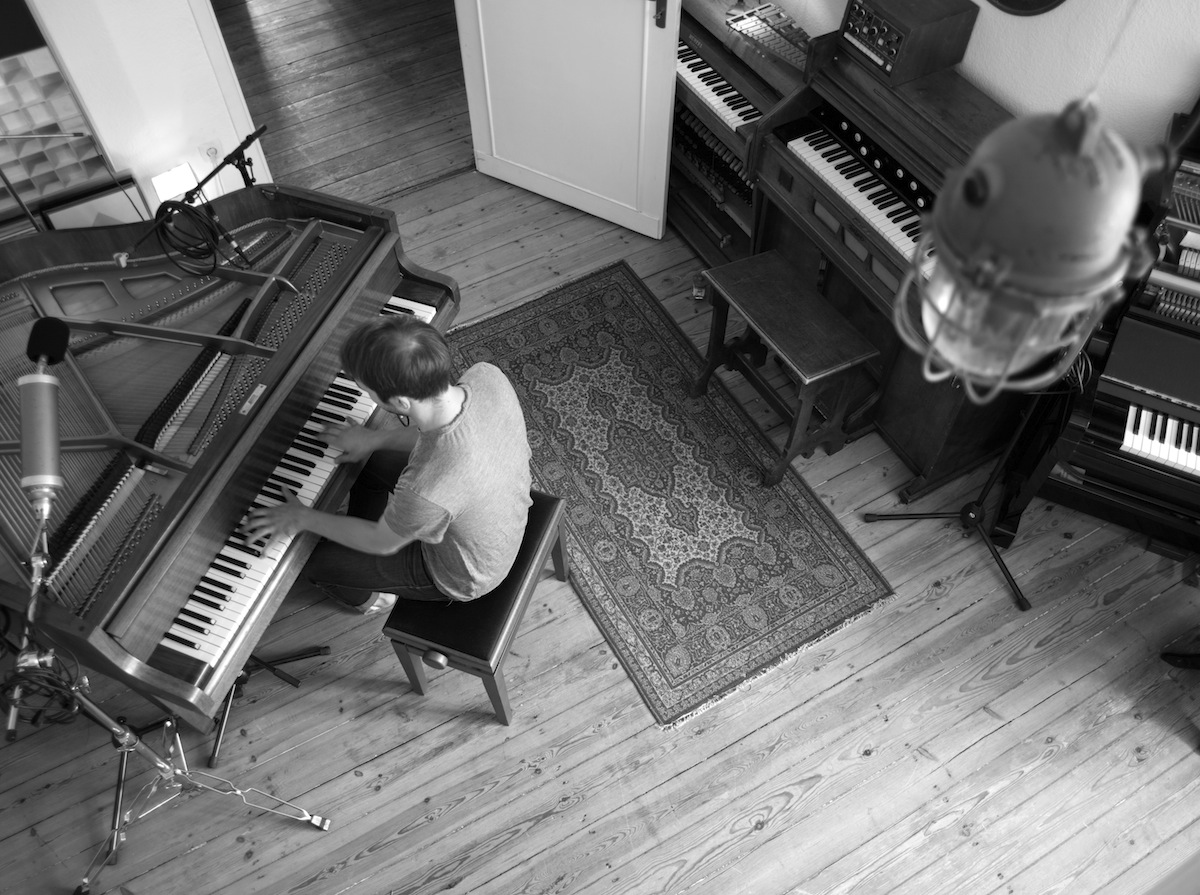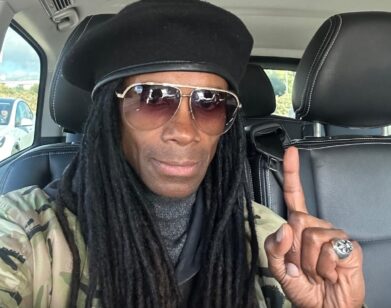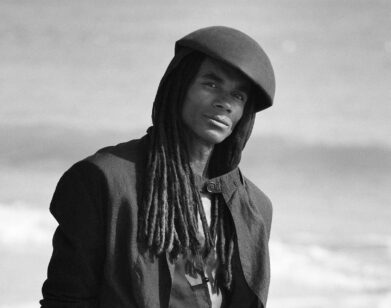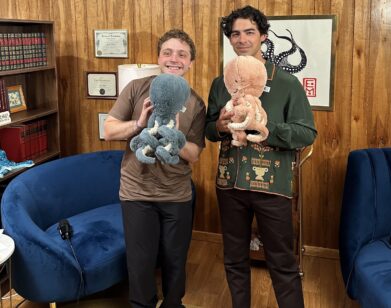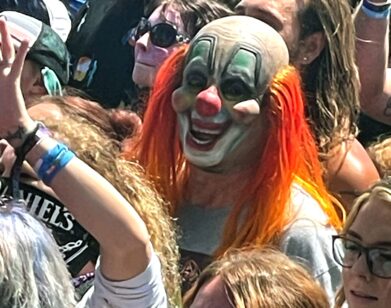Exclusive Song Premiere and Interview: ‘Says,’ Nils Frahm
ABOVE: NILS FRAHM. PHOTOS BY ALEXANDER SCHNEIDER
When Nils Frahm welcomes you into his Berlin home/recording studio, he means it. There’s the coffee, unasked for but desperately needed. The nonchalant inquiries into your trip. And the casual tour that ends with both of you hunched over his impressive record collection, as he searches for the right track to illustrate a point. By the time you sit down to the tricky process of talking about him, it feels like you’ve already been friends for ages.
It’s no accident that Frahm is an apt host. Over eight years and nine releases, Nils Frahm has slowly etched out a career by bringing the listener into his personal space, his intimate recordings seemingly meant for an audience of one. But now, for his 10th offering Spaces, the 31-year-old pianist is moving his classical compositions out of the bedroom and onto the stage. Recorded over the course of 30 concerts, Spaces is a snapshot of Frahm in his element as a performer: improvisatory, wild, heartfelt—and often, quite humorous.
Over the course of a lazy Sunday afternoon, Frahm filled us in on the artistic theory, success and failures, and feng shui that contributed to his newest project. He also graciously provided us with an exclusive premiere stream of Spaces track “Says.”

LAURA STUDARUS: I’m enjoying your new album, Spaces. Are you classically trained?
NILS FRAHM: I had piano lessons when I was a kid for a couple of years. And then I worked more with people from my school on band projects. Because of that, I needed to know more about music theory. So I had classical lessons first. And then some jazz lessons. After that, I wanted to study. I looked at a few universities. But there’s only classical music you can study. Full-on classical or full-on jazz. Nothing in between. Now you have private pop academies. I feel like there’s something about music which you can’t accomplish academically. Maybe the schools got much better. When Miles Davis came to New York, he was also in a classical music school. But he learned all his skills in jazz clubs. He just hung out with a few people who told him a few things that were much more important than whatever a university had to tell. I trusted on that and started straight working after school in different jobs, and then I did music on the side. I got to know my way around a studio in that time.
STUDARUS: Can you learn to experiment, or is it something you just have to do?
FRAHM: It’s all about aesthetics, I think. To hold a pencil or to paint something, you can learn that. You can learn to write. But what you write is something that depends on your taste and on your vision or whatever. Also, of course, the music I listened to inspired my idea of music. When people ask me “Where’s your inspiration? Where does it come from?” I have no idea. Music is about music. Not about life and love.
STUDARUS: The passion is wrapped up in the fact it’s music.
FRAHM: No, I just have to do it because I need money. [laughs]
STUDARUS: Are you willing to take risks or try something new when it isn’t about music?
FRAHM: I get bored with things easily. I always have to change something to keep myself excited. When I feel like I did a really good classical and acoustic album, the next thing I want to do is the opposite. And then I want to do the opposite of that. When I work alone after that, I feel like I should work with a lot of people. When I work with a lot of people after that, I feel that I should work alone. So it is about covering a wide range of what’s possible as a working artist. Not only in music, but growing into a position where you also expand the music a little bit. I like to talk about the music.
STUDARUS: Is there something specific to this album that you’re communicating that might be different from Screws or your previous work?
FRAHM: For Spaces, I have this argument with myself: Is it, or is it not possible to isolate sound recording from live concerts, put it out of context, where it has happened, and then put it into a medium where people can listen to it whenever they want— while they’re working, while they’re cleaning, while they’re having dinner. The music I do in live performances is made for a specific situation. I know that people are sitting down and shutting up and they’re with me for 90 minutes. They’re totally with me. Whatever I do, I know they have my attention and they follow my pace.
STUDARUS: Did you have any examples of concert albums that you feel had been done well?
FRAHM: I was listening to a lot of live albums, actually. There are only a few that really made a difference. There’s Neil Young, Live Rust, which is a great live document. I like his studio albums, but this one really transports a time document. You can feel the energy. It’s wonderful, but it’s also sad, because you wish you were there. It’s kind of a grainy black-and-white photo of something really great, and you can’t get all the details. I think a live album is almost impossible to accomplish. It needs to be something different. I think a live concert album, in a perfect way, should be listened, or received in the way you would a concert. I’ve always made records which are good for a home listening situation. Screws, Felt. They don’t have these immense peaks and drops. It’s more like a steady level. So in a Brian Eno kind of way, it’s ambient music. It’s the art of having something that can be in the background and doesn’t distract you. But when you focus on it, it’s exciting enough that you don’t get bored. By releasing a live show, it kind of has to fail, in a way.
STUDARUS: What makes you say that?
FRAHM: I feel like people will run to the stereo when it gets really loud, and they want to talk to somebody on the phone. When it gets too quiet, they’d have to turn it up. People have asked me for a long time, “Why haven’t you recorded a concert and put it out, it’s so amazing!” I’ve always tried to explain to them that it’s not easy to translate that experience you just had into your living room.
STUDARUS: What steps did you take to make that happen?
FRAHM: I’ve had to edit and work on the mixing side of this live album a lot. To meet in the middle ground somewhere. It’s still the idea of the live concert, but it had to be altered in ways so that it still works for a record release. It was really painful, too, because when you edit your own material, it’s like trying to Photoshop your own face. Oh, there’s some wrinkles under my eyes, I should try to get rid of that. There’s a little note which I don’t like. Should I cut this out or not? An improvised concert is so wonderful because once it’s played, it’s gone. That gives you such a freedom. But if you know it’s going to be recorded and people will listen to it over and over and over again, this one bad note will always spoil your mood.
STUDARUS: Even as an accomplished live performer, was there an element of danger, knowing that you were making a lasting document in front of a live audience?
FRAHM: That’s why I recorded over 30 shows. Because I didn’t want to feel like, “This is the recorded show. It has to be perfect!” I wanted to forget about the recordings. I did so many recordings of so many shows that recording my shows became something totally normal. I totally forgot about it. Once I was on stage, I was playing for the people and for the moment. Which was the point. You get this amazing energy. Only with the risks I’m taking and the mess-ups, which is the consequence of that. It gets exciting. The real art about Spaces was to select the right bits. Because then you have every piece 30 times.
STUDARUS: So did you ever give in to the temptation to edit the performance to the point where it no longer felt like a performance?
FRAHM: I’m really aware of all these imperfections. When we work analog now, we appreciate the artifacts. When someone plays a real instrument like I do, we love to feel that. It’s a real piano! On my records, you hear the keyboards, you hear the cracking, you hear all these things which really makes it clear that this is wood and material and felt. Back in the days when people only worked analogue, they wanted to hide the hiss of the tape. They wanted to hide things which they found annoying. That’s why when digital came, they were so excited. “Oh my! We have no crackles on the vinyl! We have the CD.” Times have changed back to where people like the crackles on the vinyl. I take all these things into consideration. It’s very much a philosophy of mine, how technique and inventions of mankind changes our society. It changes our perspective and reception of the world.
STUDARUS: Given that mission statement: how did you decide to use a lot of synths on this album instead of giving completely piano-based shows?
FRAHM: First I start and dive into something. It’s all motivated by some intuition. Then I see the red thread through it afterwards. When I started the live recording thing, I didn’t know what was important and what I should focus on. I just knew that I should record a lot of shows. Then afterwards it really came together. This is how I always worked. When I started Felt, only just before I finished I came up with the title: Oh yeah, I’m using felt on every piece. Then it all came together and had this one connotation—a special kind of coloration. Then I see the bigger picture.
STUDARUS: Given that, does the word Spaces have a specific meaning for you?
FRAHM: Spaces is obviously not the most original title for a record. But in this case it really fit, because it is describing what is so amazing about playing shows. The space alters the performance. The performance is always determined by certain things. It’s the audience, it’s the instruments I’m having that night. It’s the acoustic space. It’s the feng shui.
STUDARUS: Are you a feng shui kind of guy?
FRAHM: [laughs] I wish I knew more about it. I know that space and architecture and everything that surrounds us has a strong effect on us. Everything vibrates, and everything has energy. Of course people affect it the most. When you go on stage and get a warm applause, it’s a different show all of a sudden than if you come on stage and people are shy. You feel these things immediately. Then you deal with it. If people are very quiet, you can play differently than if the people are very chatty and whispering. So Spaces is like if you cut a tree in the middle. You see all the details and all the different things which are going on. Every piece comes from a different room and a different night and a different instrument. It’s more of an average.
STUDARUS: I was going to ask what your favorite space to perform is. But as you’re describing it, every space is different every night.
FRAHM: And each piece has its favorite space. Some pieces work better in a big room, some pieces work better in a small room. Some performances could not have done with a small audience. They need to be played for a big audience. That all changed. I found for each particular piece, a perfect match of people, environment, acoustics, instruments, and my condition.
STUDARUS: Are there any specific tracks on this album that are big-audience or little-audience specific?
FRAHM: Yeah. The very beginning, the dub song. It’s electronic. It was maybe 150 people watching. You hear this awkward applause in the beginning with people laughing. This is also part of my show, this twinkle in the eye. When you have all these heavy, sad moments, and melancholic moments, you need to wake the people up and get them out of that feeling. For me, that’s part of the live experience. People have to laugh at certain spots to counteract the heaviness of it. I don’t want to be a clown. But it really helps the performance and how people receive it. In the end, it’s an experience. Whatever you do as an artist, people have to have an experience. It’s not about the details or the wrong note or what tuning the piano is. It doesn’t matter. It all doesn’t matter. It only matters what people think when they leave the room and what their impression was.
STUDARUS: That’s one thing I’ve always appreciated about you and your work, it seems like you always have had a sense of humor about it. I feel like that’s something many people overlook. I remember reading the liner notes for Screws and the story about how it was inspired by breaking your thumb.
FRAHM: Oh yes, I’m a very melancholic person. [laughs] Of course not! I want to have some fun. I want people to laugh and not take it too seriously. I wish in metal music they could also include that, that they could just be themselves and just play beautiful ballads in between. All the people in the audience would be like, “What the fuck are they doing?” Confusion is the only state of mind we have where we are really out of our patterns and what we expect. Because of that, you’re open to new experiences. The irritation in concert performances is really important. When people get really irritated, they listen on the front of their stool and ask, “What’s going on?” If I deliver what they expect—sad, soft piano music—then people would just shut down.
STUDARUS: Things like playing with toilet brushes in a live setting, does that come from a place of wanting to confuse? Or are you just using the tool that you need to get the sound that you want?
FRAHM: It has different levels. Because it’s irritating. People can’t listen to what I’m playing because of what I have in my hands. Because of the two things coming together—there’s this unexpected sound coming from the piano, which they have to digest; then seeing that I have toilet brushes in my hand, it’s a total overkill of information. In that moment, they’re with me and they want to figure out what I’m doing. Politically, I think everything is an instrument—in a Matthew Herbert kind of sense. You can make music with your kitchen; you can make music with your toilet. You can make music with anything. You don’t need $80 drumsticks to make a good sound. You can use whatever. It’s a little bit like African musicians, who build instruments out of trash. It also has that element, which I really like. Those toilet brushes from Ikea were two bucks. They’re the cheapest drumsticks I could find. They sound beautiful on the piano. It’s a lucky find. Always when I have a silly idea like that, I just try it out and see what happens. If the people giggle or laugh, I think I accomplished my mission.
STUDARUS: And what’s the worst that can happen? If you don’t like it, you can do something else.
FRAHM: Yeah. And I kind of make myself a little bit untouchable. When I make a fool out of myself or when I don’t take myself seriously, I’m in a comfortable spot where I don’t need to be reasonable. There’s no reason to be reasonable. This is what I want to do and where I have full control. I determine what I want to do.
STUDARUS: It sounds like you don’t really have a fear of failure.
FRAHM: I have somewhere in myself, the confidence that whatever I do has its place somewhere. Just do it, just do it. I think this is also what I don’t want to loose.
STUDARUS: A lot of people try to pretend that they never think about audience expectations.
FRAHM: That would be silly. Of course I think about it! Especially if it’s the only thing that you do. Of course you should think about it. I have 24 hours a day to reflect on myself and what I’m doing. This is my work. There’s enough time to wonder if what I’m doing now has the same quality as what I did before.
STUDARUS: Is making music the best way to get out of your head and get on with it?
FRAHM: Then there’s this magic moment where I record a beautiful take and I listen to it. You don’t think about the fact that people will listen to it. You just have this intimate space with yourself and the music. If it feels right, it is right. It must be right. In that moment, I never feel like, “What will people think of it? Should I make it shorter or longer?” That comes when I mix it. It’s close to being done, and I can see it in context with the other tracks. Before I send it to mastering, that’s when I get all nervous and stressed out. Should I cosmetically fix this? This is the dangerous part. It’s the crucial moment of it all. You need to maintain or prolong this moment of intimate creation and try to never get into this spot where you see yourself from above and try to measure the distance between you and the audience and the label and what they expect.
STUDARUS: So you need to be a creator without a God complex.
FRAHM: I kind of hope that I will never make the perfect record. When I feel like I have done it, like Mark Hollis did with his solo record after the Talk Talk records, he had to stop. It got better and better and better. It’s so wise just to disappear after that. I don’t want to disappear yet! So if I would make this record where I feel like nothing I will do will top that. Then someone would need to kill me or I would need to stop!
STUDARUS: What would you do if you stopped? Become a farmer?
FRAHM: I really enjoy working with my hands. I would like to build furniture. I want to build my own house at some point. [gestures around him] All the stuff in this apartment I built myself. Everything. I really want to build stuff and do something with my hands, and when it’s done you can see something. It’s very healthy for my mind. When I work on a computer on five programs at the same time and I shut it down, it’s like “What did I do again? Was it worth anything?”
STUDARUS: Do you get that same buzz of creation when you see the final album and you’re holding it in your hand?
FRAHM: Yeah. Of course I have this moment where I realize that’s what the work was about. But then you put it in between all your other records, and it’s so slim. Where is it again? Oh, it’s gone. When you release an album, you put a drop in the ocean of music. It’s not really about that. It’s about how to process of making music keeps me healthy in my head. This is my medicine. If I couldn’t get obsessed about this whole creation of music I would get obsessed about other things. I don’t know if that would be good. I tend to get frustrated with how things work. The world spins in the wrong direction for me right now.
STUDARUS: If you had a kid one day who wanted to go into art or music, would you encourage that?
FRAHM: Yeah. [laughs] I think I would encourage them for whatever they wanted to try. My father would have become really upset if I had become a lawyer or a finance expert or whatever. That would have been something not too thrilling for him because he doesn’t know anything about that and we couldn’t have all these amazing discussions. We connect on so many levels because I do art myself. It’s amazing. We always have something to talk about.
FOR MORE ON NILS FRAHM, VISIT HIS FACEBOOK PAGE. SPACES IS OUT NOVEMBER 19 VIA ERASED TAPES.

